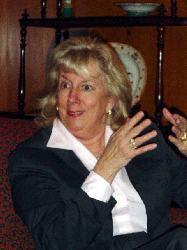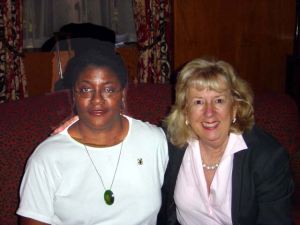Ayo: | Your latest book is called The Kills and is the sixth in the series. What gave you the idea for the book? |
Linda: |
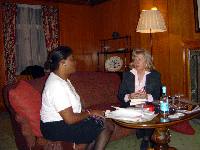 Thatís a question I like to answer! I woke up one morning and Justin had taken the New York Times, and the top part of it had this huge coloured photograph of a coin. Quite a beautiful image, but heíd circled the second and third paragraphs in red where it said ďIf Dashiell Hammett were alive heíd write the tale of this fabled coin with this mysterious background.Ē So, Hammett being one of my idols and a great American master of crime stories, I said whatís this about? Justin said ďHammettís dead, why donít you write this story, itís so interesting.Ē So I started to read the Times article. From there I rang up a few refugees who had heard of King Farouk as there used to be an expression that someone is as rich as Farouk but I didnít know anything about him: I didnít know that he was a collector, I didnít know about the whole assassination plot, that he was a name. I began to read the history of the coin which was fascinating, and the biographical history of some of the people involved. Also, I actually had a trial in 1982 involving a Yale University graduate who had allegedly been a CIA operative and every time I tried to get information about him Iíd be told, you know, secret files, top government information, you canít have it and so on. The Middle East is so much in the news and the idea of taking a 1940s/50s story, a real coin that has an interesting history worth twenty dollars then, selling for seven million now, I know people who would kill for twenty dollars so imagine if there were two of them. So that is a long version of the genesis of the story.
Thatís a question I like to answer! I woke up one morning and Justin had taken the New York Times, and the top part of it had this huge coloured photograph of a coin. Quite a beautiful image, but heíd circled the second and third paragraphs in red where it said ďIf Dashiell Hammett were alive heíd write the tale of this fabled coin with this mysterious background.Ē So, Hammett being one of my idols and a great American master of crime stories, I said whatís this about? Justin said ďHammettís dead, why donít you write this story, itís so interesting.Ē So I started to read the Times article. From there I rang up a few refugees who had heard of King Farouk as there used to be an expression that someone is as rich as Farouk but I didnít know anything about him: I didnít know that he was a collector, I didnít know about the whole assassination plot, that he was a name. I began to read the history of the coin which was fascinating, and the biographical history of some of the people involved. Also, I actually had a trial in 1982 involving a Yale University graduate who had allegedly been a CIA operative and every time I tried to get information about him Iíd be told, you know, secret files, top government information, you canít have it and so on. The Middle East is so much in the news and the idea of taking a 1940s/50s story, a real coin that has an interesting history worth twenty dollars then, selling for seven million now, I know people who would kill for twenty dollars so imagine if there were two of them. So that is a long version of the genesis of the story. |
Ayo: | Did you go to Egypt to do any of the research?
|
Linda: | No, but I wish I had the opportunity. I have been in Egypt, I love Egyptology, I love the history - not so much the modern history, but all the archaeological aspects which led to my interest in The Bone Vault in which I had the sarcophagus and the museum things. I went to Egypt in 1984 and spent ten days touring around a lot, so I had that piece of intrigue and interest, and knowing the landscape a little bit I did not go back for this research. I just read a lot about it. I need to have Alex travelling a little more.
|
Ayo: | In all your books you manage not only to write a first-rate thriller but also manage to include contemporary social relevance. In The Kills you deal with, amongst other things, date rape and abuse. Is this always intentional?
|
Linda: | Yes. I love books that entertain. Thatís the purpose of writing them in this genre because itís what I like: to read and to be entertained. I enjoy stories that are not just car chases or shoot-outs but ones that I come away from having learnt something myself. So I like to give the reader that same kind of experience; take them into a world perhaps they donít know, so they come away saying did Farouk really collect red cars, or Faberge eggs, or was he assassinated or not? So it is intentional that I deal with date rape. The issues in that case mirror the one that I tried in 1982: in the opening scene where the judge says ďwhy do you think she went to that apartmentĒ, ďwhat did she want at that hour of the nightĒ - unfortunately they are the same questions that most judges ask now.
|
Ayo: | All the books in the series so far are exhilarating, clever, and entertaining to read. The Kills is no exception. Have been they easier to write since you retired?
|
Linda: | Very good question. Iíve two answers to that. Yes, because I think in all fairness to the readers I can now immerse myself entirely in the book. Thereís no beeper going off saying something happened and itís going to be two weeks before you can sit down. In terms of the pacing, if in the writing of it every day helps the reader say ďI canít put it downĒ, then thatís what Iím aiming for and I think the book moves better because Iím in it every day. So yes, I think the books are better written and better paced, if I may say, because Iím writing full time now.
|
Ayo: | Your husband, Justin Feldman, always has a cameo in your books, but this time he has a speaking part. I know that he likes being in your books but the fact that heís graduated to something a bit more - how does he feel about this?
|
Linda: | I think heís very pleased with it. I also think what he liked most was the very big acknowledgement at the very end. Because he gave me this story to do I thought that it was very important that he had a bigger role, but it was cut. Originally he drove Alex home to her house when they got over that flight from the airport. She reflects on the fact that heís got a wife who is high profile in what she does and he copes with her success very well, while her boyfriend Jake canít deal with that. But my editor thought that it was extraneous and that we didnít need it.
|
Ayo: | All the characters in your books have changed as the books have progressed. Have they changed in the ways that you imagined?
|
Linda: |
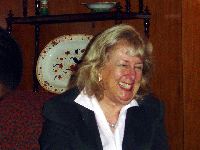 No. Itís interesting because people often ask it that other way, but this is a more interesting way. I used to watch the shows; I mean in the States we have a lot of television talk shows that are just books e.g. Charlie Rose does great interviews, Barbara Walters, Larry King etc., and in a series I am very conscious from reading other writers that I admire that you need the characters to evolve and to grow. Part of the surprise is that Alex Cooper is professionally reflecting my views, attitudes and interests but personally she is very different and so, because I started out so distinctly identifying with her in the first book, part of the challenge has been watching her grow and change as well as the other characters take on lives of their own. I used to listen to people on Charlie Rose say that and I would say ďOh, this is nonsense, theyíre just fictional charactersĒ but they do you know - there are things that Mike Chapman would do that Mercer Wallace would never do. Mercer has his own code of ethics and his personal interests and Mike would cross someone and they begin to do things that truly even surprise me - in a sense they tell you what to do. Very weird, to all those writers I used to say nonsense, I take it all back.
No. Itís interesting because people often ask it that other way, but this is a more interesting way. I used to watch the shows; I mean in the States we have a lot of television talk shows that are just books e.g. Charlie Rose does great interviews, Barbara Walters, Larry King etc., and in a series I am very conscious from reading other writers that I admire that you need the characters to evolve and to grow. Part of the surprise is that Alex Cooper is professionally reflecting my views, attitudes and interests but personally she is very different and so, because I started out so distinctly identifying with her in the first book, part of the challenge has been watching her grow and change as well as the other characters take on lives of their own. I used to listen to people on Charlie Rose say that and I would say ďOh, this is nonsense, theyíre just fictional charactersĒ but they do you know - there are things that Mike Chapman would do that Mercer Wallace would never do. Mercer has his own code of ethics and his personal interests and Mike would cross someone and they begin to do things that truly even surprise me - in a sense they tell you what to do. Very weird, to all those writers I used to say nonsense, I take it all back.
|
Ayo: | How disciplined are you when it comes to writing and do you know where the plot is going before you start?
|
Linda: | Well, in the process of writing I think disciplining myself to write was the hardest transition I had to make. When I started writing Final Jeopardy in the summer of 94, it was on vacation time from the other job which was all-consuming and it was very easy if a friend called to distract me or say I deserve the afternoon off. Now this is my job and so I am very proud of myself that I have learned that when I am writing during the summer (we take three months and go to the vineyards where I really can isolate myself) and despite the fact that there are tremendous temptations - itís quite beautiful, friends are around that I often donít see all year - itís the time to go swimming and relax as well. I go down in the morning and the process of disciplining myself is a joy and I really like being able to say no to temptation so I get five pages further in the book. And to the question ďdo you know where the plot is going before you startĒ, I always know when I start who the killer is and why he committed the crimes. The hard-boiled guys who say that cops donít know who did it when they get to the crime scene and find the body so the author doesnít have to know, okay, thatís them. But I think that to be really fair to the readers you have to know where youíre going because you need to lay in enough clues that are subtle and not just so someone says I never figured that. I like to look back and say, you know, she mentions that a character went there or that Cageís father was a tutor. I never outline a full book but I do sketch out five chapters at a time so I know where the scenes are going.
|
Ayo: | What do you consider to be the most important element in crime writing?
|
Linda: | I have this debate with my crime writing friends all the time. I think that most of us just change the order. I think that plot and character are the two most important things and in a series I might have started out by thinking that character was the most important; now most people who read the series know the continuing characters so thatís easier for me. I start out so much easier in a series because you come to the next book with several fully-formed characters as opposed to a standalone where you will be creating more. So I think for people who read in this genre in particular, it is so important to plot well. You need to garner their interest, it has to be complex enough to pull, it has to make sense, it has to pull together, and the hardest thing is an ending that works. I think that in crime fiction plotting is so critical if you want to be a successful crime novelist.
|
Ayo: | In 2001 The Deadhouse won the Nero Wolfe Award. How did you feel about this when you realised youíd won?
|
Linda: | I was very thrilled. There a good number of awards in this business and Nero Wolfe is one of the masters Iíve read and identified with since childhood because in one of his books the crime took place very near the city Hoboken where I grew up. The Edgar and the Nero Wolfe are probably the two biggest awards. So it was an enormous thrill to first get a call from my editor that I was being considered for it and then to win; and then there was a very lively awards dinner with the Nero Wolfe Society where people are just devoted to the books. They call out quotations to each other from among the seventy-eight or so novels that he wrote. Theyíll say ďNo no! The bottle of sparkling water or the glass of Champagne is on page 72 of the forty-sixth book.Ē You donít dare mention anything about Nero Wolfe without knowing it to a point in that room.
|
Ayo: | Do you have any plans to write another series or a standalone novel?
|
Linda: | There is a whole other series that I would love to do - I already have the first book written in my head. I think the great thing my publishers both here in the UK and at home did was believe in me and wait while I was working in my full time job. I was not delivering to deadline but they were very patient in growing me because they knew the other job was so important to me so I really feel that I owe them establishing the series and getting my books out first. So at the moment the other series is a pipedream that will probably come to fruition. Yes I have at least three standalones; two of them based on real cases that I worked on which I donít think will fit in this series. I could give the prosecutor much more latitude and even let her do some more outrageous things.
|
Ayo: | I understand that Entombed is the next novel that you are writing can you tell us a bit more about it?
|
Linda: | Yes, Iíd love to. It has a lot to do with the same characters so obviously a very current setting, but it also has a lot to do with Edgar Allan Poe. He is, for me, the first American master of detective fiction and as an adolescent when I found him, he kept me up late at night reading about people being buried alive. But going back and reading him as an adult
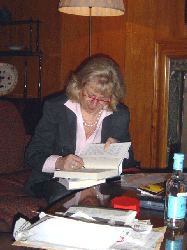 I considered him the great genius in the field and in reading about his life I was startled to learn that he had about the most dysfunctional life of any human being. From when he was a complete toddler abandoned by his father (his mother died when he was three) nobody in the family would take him in so he was farmed out to the Allan family. They wouldnít even adopt him or give him their name. He went to the University of Virginia - the college where I went to Law School; his room there is still preserved perfectly. By that age he was gambling and drinking every day and became addicted to opium shortly after. He married his first cousin Virginia when he was twenty-six, and she was thirteen. She died soon after and I had no idea that he died at the age of forty. I also had no idea that he spent as much time as he did in New York; several years ago New York University bought a house called Poe House that he had lived in in Greenwich Village and they decided to tear it down and build a new Law School. Mystery Writers of America and several of the literary groups protested and sued but in a major law suit that lasted about five years, we writers lost and Poe House was demolished just months ago. So I thought what if, in demolishing it, a womanís skeleton was found bricked up behind the walls - clearly we donít think Poe did it, but why did someone do it in a Poe manner, in Poe style, in his house? That gets Alex into the story and then Justin plays a big role in this because he said to me ďYou know I grew up in the Bronx, three blocks from Poe ParkĒ. I didnít know that there was a Poe Park in the Bronx and there is actually still standing, not much bigger than this room that we are in, a white clapboard farm house from the nineteen century in which Poe and his wife lived, and in which Virginia died, which is perfectly preserved. Itís the most grim, awful little house but he wrote some of his greatest works there. Itís now a city park twice the size of this room and one of the most beautiful gardens in the United States. New York Botanical Gardens is a couple of miles of way and Poe used to walk there every day for inspiration. Itís the only fifty acre forest in the middle of New York City.
I considered him the great genius in the field and in reading about his life I was startled to learn that he had about the most dysfunctional life of any human being. From when he was a complete toddler abandoned by his father (his mother died when he was three) nobody in the family would take him in so he was farmed out to the Allan family. They wouldnít even adopt him or give him their name. He went to the University of Virginia - the college where I went to Law School; his room there is still preserved perfectly. By that age he was gambling and drinking every day and became addicted to opium shortly after. He married his first cousin Virginia when he was twenty-six, and she was thirteen. She died soon after and I had no idea that he died at the age of forty. I also had no idea that he spent as much time as he did in New York; several years ago New York University bought a house called Poe House that he had lived in in Greenwich Village and they decided to tear it down and build a new Law School. Mystery Writers of America and several of the literary groups protested and sued but in a major law suit that lasted about five years, we writers lost and Poe House was demolished just months ago. So I thought what if, in demolishing it, a womanís skeleton was found bricked up behind the walls - clearly we donít think Poe did it, but why did someone do it in a Poe manner, in Poe style, in his house? That gets Alex into the story and then Justin plays a big role in this because he said to me ďYou know I grew up in the Bronx, three blocks from Poe ParkĒ. I didnít know that there was a Poe Park in the Bronx and there is actually still standing, not much bigger than this room that we are in, a white clapboard farm house from the nineteen century in which Poe and his wife lived, and in which Virginia died, which is perfectly preserved. Itís the most grim, awful little house but he wrote some of his greatest works there. Itís now a city park twice the size of this room and one of the most beautiful gardens in the United States. New York Botanical Gardens is a couple of miles of way and Poe used to walk there every day for inspiration. Itís the only fifty acre forest in the middle of New York City.
|
Ayo: | What do you think of the current crop of crime programmes that are presently being shown - for example CSI, and Law & Order (SVU) programmes?
|
Linda: | I like them. I must say I think theyíre very derivative of crime fiction. I think that Patricia Cornwell started the whole interest in forensics in fiction and that interest from literature really vaulted the shows into existence. The problem that we have with things like CSI in real life is that there are probably not even three police departments in the United States who can afford that equipment. So now everybody comes up to jury pools and they think whereís the guy that puts the luminal all on the walls etc, but it just doesnít happen. Itís very interesting that the fiction has made changes in law enforcement with these techniques. My relationship with Law and Order is a little different because the creator, Dick Wolf, has spent a lot of time with colleagues and former colleagues of ours, and Mariska Hargitay, who is Detective Benson, trained with the Rape Crisis Unit at one of our great teaching hospitals. I am on the Board of a hospital and she has taken the training with the volunteer advocates and lent her name very graciously and helped raise a lot of money for rape victims. So itís really giving back to the community from which she has got her fame which is a nice fact/fiction redress.
|
Ayo: | Apart from yourself, what other crime writers would you suggest readers might like to try and why?
|
Linda: | Iíve said many times, Patricia Cornwell, whose books attracted me first and got me to try to write in this field - I think that she was a few Scarpettas away when I started, but I believe that by the end of the year there will be another one. I love Robert Crais whom I think is one of the best Americans writing crime; L A Requiem is a great place to start if you havenít read it. I believe that he is overdue for another one soon. I tend to like hard-boiled, I like Michael Connelly a lot; I like an American woman called Nevada Barr - I love not only the crime fiction but her character is a park ranger and so it brings you into that world that is very interesting. Cosies I donít quite fancy. Frances Fyfield, I love and read a lot, PD James, and a whole bunch of bright young Americans now doing hard-boiled. Ian Rankin, I am doing a book event in March with him and Robert Parker, another great American writer. But I am not keen on the ones with cats Iím afraid. Put me in a crime store and give me almost anybody else and Iím happy.
|
Ayo: | Is there a book out there that you would like to have written?
|
Linda: | Wow, there are a lot of books out there I would have liked to have written. I would say probably, I think the best modern thriller is Le Carreís The Spy Who Came In From The Cold, and I re-read that almost every year or so. I think that he does the most brilliant things with characters and also I think he writes the sparest prose, which is just fabulous. Gone With The Wind, I wish I had written that, a couple of Shakespeareís plays, Iíve got a fairly eclectic taste and probably the best court room drama ever written is An Anatomy of Murder by Robert Travers and thatís one I would have loved to have written.
|
Ayo: | What were your favourite reads last year and why?
|
Linda: | Portrait of a Killer by Patsy Cornwell, Haunted Ground by Erin Hart. I re-read and loved Mary McCarthyís The Group; it was one of the books that I read in High School that made me think about wanting to be a writer and actually sent me to the college that I wanted to. Robert Crais The Last Detective, Franklin and Winston: An Intimate Portrait of an Epic Friendship by Jon Meacham.
|
Ayo: | When you do get a chance to relax, what is your favourite way of doing so?
|
Linda: | Well we love travelling and London is my husbandís favourite place in the world, he would love to live here. I go to the ballet very often and the theatre, we went to Jumpers the other night and I hope to be able to go to one more before I go. Being with friends and family is very relaxing for me. Again the solitariness of the writing, I like reading, I always have a fiction and a non-fiction book beside my bedside.
|
Ayo: | Linda, thank you very much for the excellent and lovely interview! |


